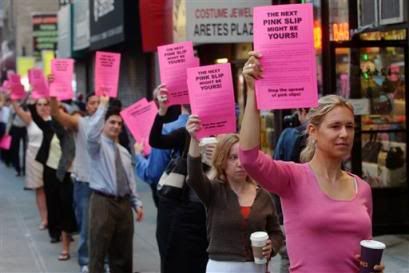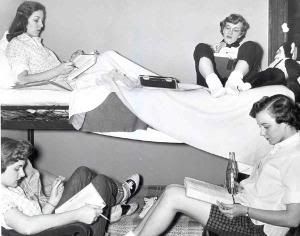
The Illinois Department of Employment Security, inaptly named, looks kind of like the Alamo. When I mention this to my gf as she drops me off there at 2pm one afternoon last week, she says, "I hope you have better luck in there than they did." It is hot and bright outside; inside the building is cool, gray, colorless. My eyes adjust to the dimness and I see two people sitting talking amidst three or four long rows of empty tables and chairs. I walk to the front desk and sign the clipboard. It is 2:05. The two figures are a woman and a man; he is clearly some kind of security guard and she is talking with him to pass time while she waits for someone to attend to her. I get my paperwork and begin to fill it out.
I am faced with the problem of academic jobs before I even choose which tray to take paper from. There are three trays. One is labeled "Quit," one "Fired," and one, "Laid Off." I know I didn't quit my job, but what does it mean to deny someone tenure? Was I fired, or was I laid off?
The desk guy, a thin graying white man, hesitant to the point of apology, resembles the eighth-grade teacher who lets himself slide into a disastrous affair with a student for lack of anything better to do. When I explain my situation to him, he tells me in a furtive voice that I was probably laid off. I take my paperwork and go back to my seat.
What is your education? How long did you work for your employer? What was your job title? What were your reasons for leaving? Do you belong to a union, and if so, are you in good standing? Do you believe you lost your job as a result of discrimination?
Each question seems like an essay topic, a basis for philosophical reflection, an accusation. How could I be so educated and not have a job? How could I work for someone so long, be so qualified, and be treated so shabbily? Why don't I belong to a union, and have a union rep standing up for me? Why did I fail to attribute a miserable workplace climate to the institution's disregard for the happiness and wellbeing of skilled employees? What did I think would happen? How, how could I be so stupid for so long? These questions swirl in my head. Every memory of compromise flits through my brain: the years of paying for professional clothes, airplane tickets, and conference fees on a TA salary, in the era before Graduate Travel Assistance funds (what there are of them). Years of paying for MLA, gambling on a vanity career that ran up my credit cards, ensuring I wouldn't be able to make it on a starting salary even when I got one. What are your reasons for leaving?
At 2:30 I'm still mulling these questions over, so I don't mind that no one seems to care to wait on either me or the woman talking to the security guard. At one point a woman blows in the door, storms up to the desk, and demands payment for a check that seems to have bounced somewhere and cost her money. Her voice rises with every sentence. Heads begin pop out of cubicles, more and more with every minute of this arresting drama. At one point angry woman begins to yell, and it looks as if there might be an ugly standoff between her and the pink-blazered middle manager trying to calm her down. Angry woman storms out, transforming the cubicle inhabitants behind the "help" desk into a swirl of clucking, arm-waving chickens who gather in various piles behind Pink Manager. Pink Manager tells her side of events to chickens, who disappear and reconvene in small animated groups behind the desk/gate. At some point we learn that angry woman has tried to cash an illegal unemployment check at a currency exchange, which bounces the check and charges her a fee. Chickens everywhere shake their heads.
Three o'clock passes. Neither of us has been waited on in the interim. The other woman turns to me and says, "This is the worst fucking unemployment office in the whole damn city." I nod cautiously and smile, trying not to look prim but unsure of what my exact response should be to a stranger saying "fuck" to me in a loud voice. I realize I have screwed up one of my sheets, and I go get another paper from the desk. When I come back, I say, "It's a good thing I DON'T have a job, 'cause I'd lose it waiting around here all day," and she throws back her head and laughs loudly. I feel happy about not being too uptight to communicate with strangers, but inside of course I am ready to cry with the grimness and stupidity of this place. I call my gf to tell her they still haven't seen me, and she tells me to stay and get it over with, since I've already lost the whole afternoon to it. Pink manager comes back and calls to my laughing friend, who explains her situation, which seems to involve someone else using her social security number to file a claim. "Sir?" Pink Manager calls to me. "Sir?"
When I realize she is talking to me I tell her I'm a Ma'am and that I simply want to file. Pink Manager says someone is on break but will be back, and disappears. AT 3:25 I call my friend in Texas and tell him as loudly as I can that I've been waiting an hour and a half in an empty office. Someone from the cubicles is speaking to us again, and I hear my new friend telling him that we are both women and that no one has helped us. They call her and she gets up and goes back to the cubicles. A Latin guy with a goatee harrumphs his way to the "help" desk, flings himself on the chair, and "Honey"s me over to him. "I am telling you, these PEOPLE!" he announces to me. He hates his colleagues. I realize happily he is sooo gay.
"Paperwork!" he demands. He looks at my information and tells me I'm at the maximum rate, which is--get this--$336 dollars a week. Three thirty-six! I quickly calculate that this is what I would bring home if I worked full time for ten dollars an hour. I realize another thing about other professional jobs in so-called dreadful corporate America, which is that they usually give you severance pay when they fire you. Forget the bonuses you put in the bank for moments like these. And I get $336 a week.
"I need to leave this office and get me some drinks," Latino Queen hisses at me. "I need me a bunch of drinks right NOW." He hands me a red, white, and blue booklet and tells me that all the information I need to report every two weeks for my check is in there. "When you call in your report, the phone prompt will ask you these questions," he explains impatiently. "When they ask if you've been looking for work, I don't care if you've been in bed all day with the newspaper, you say YES. And here they'll ask you, here, oh, just give it to me!" He rips the booklet out of my hands and starts furiously circling YES after every question.
"Now Girlfriend, you are OUT of here!" he exclaims triumphantly. "Go get yourself some drinks! I know that's what I'm going to do!" I laugh and he waves me out of his presence. I gather my things and leave the Alamo. I am thinking about how I couldn't not apply for jobs even if I wanted to sit around, since living for long on $336 a week is out of the question. I'm thinking about all the people in this country working minimum wage jobs for whom ten dollars an hour would be great pay, and I'm thinking how lucky I am not to have kids, or a mortgage, or car payments. I'm thinking about jobs I'll apply for, and wondering if I can manage to convince myself anymore that academic jobs are possible, or happy, or desireable, or wise. I think about using September to study for the LSAT and maybe get a better score. I think about all the lawyers who hate being lawyers, and wonder whether anybody likes their job, really.
Most of all, Girlfriend, I'm thinking about where I can get me some drinks.




